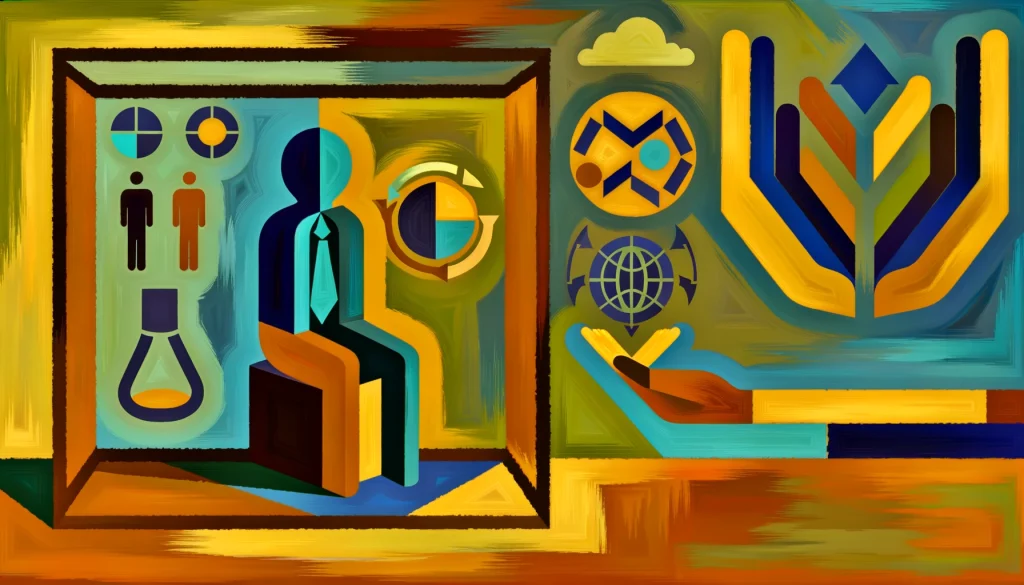We all have our flaws – I’m certainly no exception! But there’s a difference between quirky imperfections and genuinely harmful patterns. Did you know that according to a recent psychology study, most people can identify toxic traits in others but struggle to recognize the same behaviors in themselves? That’s why understanding toxic traits is so crucial for our personal development. In this article, I’ll guide you through the most common toxic traits, how they impact your life, and most importantly, how to recognize and overcome them. Whether you’re trying to improve your relationships or simply become a better version of yourself, identifying these harmful patterns is the first step toward positive change!
What Are Toxic Traits? Understanding the Basics
Have you ever wondered why some behaviors just seem to poison relationships? That's exactly what toxic traits do—they're persistent patterns of behavior that harm others and damage relationships over time.
"Toxic traits go beyond just having a bad day or a personality quirk," explains Dr. Mariah Johnson, clinical psychologist. "They're recurring behaviors that create emotional harm and dysfunction in relationships."
Unlike simple personality differences or occasional mood swings, toxic traits tend to be persistent and damaging. They often stem from complex psychological roots—perhaps as coping mechanisms developed early in life that no longer serve us well as adults.
"Many toxic behaviors actually begin as survival strategies," notes relationship counselor James Martin. "What protected you in one environment can become destructive in another."
It's important to distinguish these traits from mental health conditions, though they can sometimes overlap. Mental health disorders typically involve a broader range of symptoms and often require clinical intervention, while toxic traits are specific behavior patterns that can be addressed through self-awareness and intentional change.
- Toxic traits are persistent behavioral patterns that negatively impact relationships
- They differ from quirks in their severity and the harm they cause to others
- Many toxic behaviors develop as protective mechanisms that outlive their usefulness
- Unlike mental health conditions, toxic traits are specific behavior patterns rather than comprehensive syndromes
- Self-awareness is the crucial first step in recognizing and changing toxic behaviors
10 Common Toxic Traits to Recognize in Yourself and Others
We all have moments of less-than-perfect behavior, but certain patterns can become particularly damaging when they become habitual. Let's explore some of the most common toxic traits you might encounter—or even exhibit yourself.
Manipulation and gaslighting are perhaps among the most insidious. "When someone consistently makes you question your own reality or memories, that's gaslighting," says therapist Emma Roberts. "It's a form of emotional manipulation that can be incredibly damaging to someone's sense of self."
Another common trait is chronic negativity. We all know that person who can find the cloud around every silver lining. While occasional pessimism is normal, persistent negativity drains everyone's emotional energy and can actually rewire your brain toward negative thinking patterns.
The inability to take responsibility might be the most relationship-damaging trait of all. "When someone constantly deflects blame, makes excuses, or points fingers at others, they're avoiding accountability," explains family therapist David Chen. "This makes genuine connection impossible because there's no foundation of trust."
- Manipulation tactics include guilt-tripping, emotional blackmail, and twisting facts to control others
- Chronically negative people often dismiss positive perspectives and can bring down group morale
- Those who can't take responsibility typically have phrases like "It wasn't my fault" or "You made me do it" on repeat
- Jealousy and possessiveness stem from insecurity but manifest as controlling behaviors
- The victim mentality involves consistently seeing oneself as being wronged while denying personal agency
How Toxic Traits Damage Your Relationships
The impact of toxic behaviors extends far beyond momentary discomfort—they can systematically dismantle relationships of all kinds.
In romantic relationships, toxic traits often create cycles of conflict, distance, and eventual breakdown. "I see couples where one partner's inability to respect boundaries or tendency toward criticism has created such deep wounds that rebuilding trust becomes nearly impossible," shares couples counselor Sarah Williams.
Friendships aren't immune either. Think about how draining it feels to be around someone who's constantly negative or who makes everything about themselves. Over time, friends simply stop investing energy into these relationships.
Professionally, toxic behaviors can stall careers and damage reputations. "I've coached executives who were brilliant technically but couldn't advance because their controlling behavior or passive-aggressiveness made them impossible to work with," notes career coach Michael Torres.
The emotional toll works both ways—the person exhibiting toxic traits often experiences isolation, confusion about why relationships fail, and increasing defensiveness, while those on the receiving end may develop anxiety, self-doubt, and emotional exhaustion.
- Romantic relationships often cycle through tension, conflict, hollow reconciliation, and repeated hurt
- Friendships gradually fade as people begin to limit exposure to toxic individuals
- Career advancement can stall despite technical competence when toxic behaviors alienate colleagues
- Recurring conflicts often follow similar patterns, with the same toxic dynamics playing out repeatedly
- Both parties suffer emotionally, though in different ways
The Root Causes of Toxic Behavior Patterns
Understanding why toxic behaviors develop can be the key to transforming them. Most often, these patterns have deep roots in our formative experiences.
Childhood experiences significantly shape our relationship blueprints. "If you grew up in a household where love was conditional, criticism was constant, or boundaries were ignored, you may unconsciously recreate these patterns," explains trauma specialist Dr. Lisa Chen.
Unresolved trauma often manifests as defensive behaviors. When past wounds haven't healed, ordinary interactions can trigger protection mechanisms that appear toxic to others. That controlling behavior? It might actually be a desperate attempt to create safety in a world that once felt dangerous.
Insecurity and low self-esteem underlie many toxic traits. "The person who constantly criticizes others is often harshly self-critical. The jealous partner frequently struggles with feeling inherently unworthy of love," notes psychotherapist Robert Jackson.
Social learning plays a crucial role too—we often model behaviors we've observed in our families, peer groups, or even media. And evolutionary fear responses like fight, flight, freeze, or fawn can manifest as controlling behavior, emotional withdrawal, passive-aggressiveness, or people-pleasing.
- Family dynamics create our earliest templates for how relationships "should" work
- Trauma responses that once protected us can emerge as toxic behaviors in safe environments
- Core beliefs about being unworthy or unlovable often drive jealousy, control, and criticism
- We tend to normalize the relationship dynamics we grew up witnessing
- Our brain's threat-response system can trigger toxic behaviors when we feel emotionally unsafe
Signs You Might Be Exhibiting Toxic Traits Without Realizing It
Self-awareness can be challenging—many people exhibiting toxic behaviors are genuinely surprised when confronted with the impact of their actions. How can you tell if you might be part of the problem?
One of the clearest indicators is receiving similar feedback from multiple people. "If different people in different contexts are telling you the same thing about your behavior, it deserves serious consideration," advises relationship coach Alicia Mendez.
Pay attention to patterns in your relationship history. Do your relationships tend to end for similar reasons? Do you hear the same complaints from partners, friends, or colleagues? These patterns rarely occur by coincidence.
Another warning sign is emotional responses that seem outsized compared to the situation. If you find yourself exploding with anger over minor issues or spiraling into deep hurt over slight criticisms, your reactions may be connected to deeper issues that emerge as toxic behavior.
- Multiple people pointing out the same behavior pattern suggests it's not just "their issue"
- Recurring themes in failed relationships (like "they couldn't handle my honesty" or "they were too sensitive") may indicate toxic patterns
- Frequent feelings of being misunderstood by everyone can indicate communication problems
- If relationships consistently reach similar breaking points, examine your role in these patterns
- When "everyone else is the problem," the common denominator might be your behavior
Transforming Toxic Traits: Practical Steps for Change
Changing entrenched behavior patterns isn't easy, but with commitment and the right approach, transformation is absolutely possible.
True change begins with radical honesty. "You have to be willing to sit with uncomfortable truths about yourself," says personal development coach Jordan Rivera. "Without genuine self-reflection, any changes will be superficial and temporary."
Professional support can make a tremendous difference. Different therapeutic approaches work for different toxic traits—cognitive behavioral therapy helps address negative thinking patterns, while psychodynamic approaches might better address deeply rooted insecurities or trauma responses.
Daily mindfulness creates awareness of your thoughts, feelings, and behaviors as they happen, rather than in retrospect. "Mindfulness helps create a pause between trigger and response," explains meditation teacher Amara Lee. "In that pause lies your power to choose differently."
- Start by acknowledging specific behaviors without making excuses or justifications
- Consider therapy approaches matched to your specific patterns—CBT for negative thinking, DBT for emotional regulation
- Practice daily mindfulness even for just 5-10 minutes to increase awareness of thoughts and reactions
- Learn communication techniques like "I" statements instead of accusations or defensiveness
- Develop emotional intelligence by naming your feelings and identifying your triggers
Creating Healthier Relationship Dynamics After Recognizing Toxic Patterns
Once you've begun the work of addressing toxic traits, rebuilding healthier relationships becomes possible—though it requires patience and consistency.
Rebuilding trust takes time, especially with those who've been hurt by your past behaviors. "Actions speak louder than words," reminds family therapist Elena Gomez. "Consistent behavior change over time is what rebuilds trust, not promises or apologies alone."
Learning to establish and respect boundaries is essential. This means both communicating your own needs clearly and respecting when others say no or set limits. This mutual respect forms the foundation of healthy relationships.
Developing genuine empathy—the ability to understand others' perspectives and feelings—often requires intentional practice. "Try to listen without planning your response, and check your understanding by reflecting back what you've heard," suggests communication expert Thomas Lin.
- Acknowledge past harms without expecting immediate forgiveness
- Practice consistent behavior change rather than making grand promises
- Learn to identify and communicate your boundaries respectfully
- Practice perspective-taking exercises to develop genuine empathy
- Be patient with yourself and others—lasting change takes time and consistency
Conclusion
Recognizing toxic traits isn't about beating yourself up – it's about taking the first brave step toward becoming a healthier, happier person! We all have areas where we can improve, and identifying these patterns gives us the power to change them. Remember that transformation doesn't happen overnight, but with consistent effort and self-compassion, you can replace toxic behaviors with healthier alternatives. The journey to better relationships and personal growth starts with honest self-reflection. What toxic trait will you work on first? Your future self (and everyone who loves you) will thank you for taking this important step!






